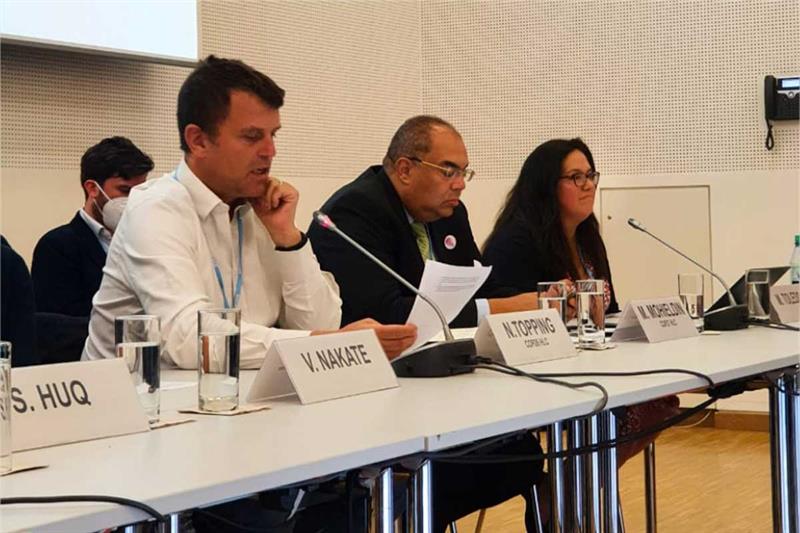
UN Climate Change High Level Champion for Egypt Mahmoud Mohieldin (centre) attending the High-Level Champions session held on the sidelines of 56th session of the UNFCCC Subsidiary Bodies in Bonn on Tuesday.
Mohieldin made his remarks during the High-Level Champions (HLC) session held on the sidelines of 56th session of the Subsidiary Bodies (SB56) of the United Nations Framework Convention on Climate Change (UNFCCC) held on Tuesday in Bonn, Germany.
The HLC session named “Actions After Impacts and Resilience” tackled the recent activities meant to build resilience to the impacts of climate change. It also highlighted the outcomes of Champions Team workshops held in May that focused on enhancing action by NSAs from civil society organisations (CSOs), the private sector and regional governments on climate losses and damages.
Mohieldin elaborated how those workshops were held with the key aim of holding an open discussion on how to accelerate actions by NSAs by sharing relevant best practices from 110 participants across 25 countries.
He cited the positive examples in East Africa where NSAs from CSOs, the private sector (power of fintech for example) and regional governments have had central roles. These actions by NSAs – if scaled – can provide practical examples of the actions and investments that are needed and help build momentum and drive an ambition loop with states, he added.

Mohieldin emphasised that this work is no substitute for action by states, saying “it is complementary, and positively supportive to the actions states should [undertake to] address loss and damage.”
He stressed the importance of not ignoring “non-economic losses” and identifying existing community capabilities when rebuilding.
He also referenced the importance of creating agriculture and food systems that can withstand the potential damages from slow onset changes like sea level rise and salinisation, and impacts of prolonged drought and changes in precipitation, highlighting the importance of insurance, data, AI, research and development.
On Wednesday, Egyptian Foreign Minister Sameh Shoukry and the Executive Secretary of the UNFCCC Patricia Espinosa officially signed on the sidelines of the SB56 the Host Country Agreement for the 27th UN Climate Change Conference, which will take place in Sharm El-Sheikh from 6-18 November.
Taking place in Bonn, Germany from 6 to 16 June, the SB56 aims to lay the groundwork for success at COP27 where governments will focus on work in the key areas of mitigation, adaptation, and supporting developing countries, particularly financially.
Egypt has reiterated the need to maintain current momentum in climate action to keep global temperature increases under 1.5 degrees Celsius within reach, with COP27 set to primarily focus on urging countries to abide by the Paris Agreement.
In May, Egypt's Prime Minister Mostafa Madbouly launched the National Strategy for Climate Change 2050, which is based on five main pillars to preserve the environment and aims to enhance Egypt’s climate change leadership internationally
Madbouly said that Egypt will spare no effort through its presidency of COP27 to relentlessly seek to move from the stage of commitments and pledges declared by the states to the stage of actual implementation of quick and tangible measures.
Egypt also launched in late May the official website of COP27, and revealed its official logo that is uniquely designed to represent the cultural identity of Egypt and Africa, according to the Egyptian foreign ministry.
Short link: